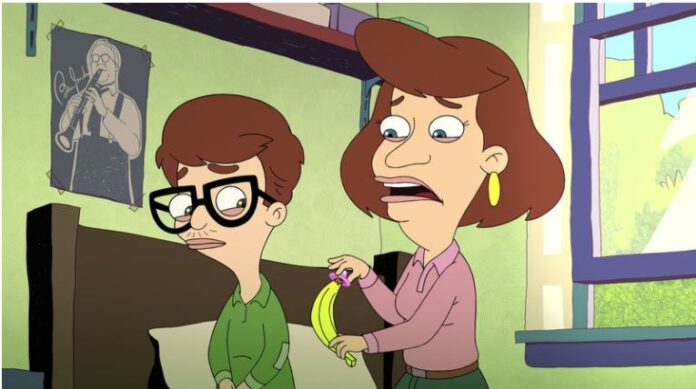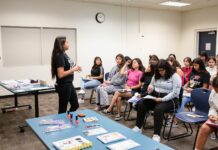In the world of Netflix’s Big Mouth, an animated comedy about tweens stumbling their way through the mysteries of puberty, every character has a “hormone monster.” Literally, a horned monster that can appear (and disappear) out of nowhere and embodies each character’s innermost urgings. When a character is caught masturbating at a friend’s house, he is whisked away by a Voldemort-like “Shame Wizard” and tried in Shame Court. In short, the show externalizes the turmoil of puberty to surreal, often hilarious effect.
Life Kit hosts Anya Kamenetz and Cory Turner talked to the creators of Big Mouth, life-long friends Andrew Goldberg and Nick Kroll about surviving puberty and shedding light on the “shameful” moments many of us keep to ourselves.
Big Mouth covers so many topics that are mortifying and confusing for adolescents — things that feel difficult to talk about and are often kept private.
…
Excerpts from the Interview
Andrew Goldberg: When something is a secret and when something is silent, whether it’s intended or not, the implication is that it’s shameful. And like with the Shame Wizard in Season 2, you know, one of our real inspirations there was Brené Brown and her books and her talks about how one of the main ingredients of shame is silence.
Because puberty can be awkward or uncomfortable to talk about — it’s easier not to talk about — the unspoken implication for kids is that what’s happening is gross or wrong or shameful, and it shouldn’t be.
What feedback have you gotten from young people and maybe even from parents?
Goldberg: One of my favorite things is when I hear that parents and kids will watch the show, not necessarily together because they don’t want to sit next to each other, but that they’ll watch it and then have real conversations.
We spoke to a writer recently who is in her 20s and was watching it with her mother, who’s in her 60s. They’re watching season three, and through Jay’s story about being bisexual, she was able to speak with her mother in a more frank way than she ever had before about her own sexual fluidity.
We we get a lot of stories about that — that it’s not really teaching people about sex education, but that it’s bringing up these discussions about sexuality that might have otherwise been unspoken.
What did you learn about how young women experience or even learn about puberty? How are they different from what you went through and what you knew?
Goldberg: Oh, my God, so much.
Kroll: Last year we were working on a story about tampons and pads, and one of the women brought a tampon into the room and just showed us how it all works. I’ve seen tampons obviously — in packaging and I’ve seen them even out of packaging — but I had no real sense of the mechanics, like how an applicator works and what’s actually happening. So there’s stuff like that.
But then there’s also just like periods, how do they feel when they got their first period? What happened? Who did they talk to? Who did they not talk to?
Goldberg: On a story level, it’s super educational too. I remember when we were breaking that story about the first period, really feeling like, ‘well, once she gets the tampon in, isn’t that the end of the story?’ And the women on our writing staff being like ‘No, that is not the end of the story. She’s got to take it out and put another one in. Like she’s only half way there.’ That kind of change of perspective, where like from my point of view, that’s the end. But to women, it was so obvious that that was not the end of the story.
There’s so much empathy in the way that you’re talking about this. Do you think it would be good for boys and girls to have this information about each other and not just about themselves?
Goldberg: 100 percent. I think we even touch on it early in the show about the kind of bias about how sex ed is taught. For men, it’s about sex, it’s about erections and ejaculations. And for women, it’s about their menstrual cycle and getting pregnant. And that pleasure element of sex is kind of removed for the female side of sex ed in most cases.
Kroll: It’s basically like, we talk to girls to be like: protect yourself physically from men and protect yourself emotionally from what’s going on, and you’re going to get your period.
But we sort of don’t … boys don’t want to talk, and so we don’t talk to them. We don’t talk to them about what they’re physically going through. And we don’t talk to them about what they’re emotionally going through. And it’s a real disservice to the boys that we don’t push through to ask, ‘what’s going on with you?’ Like, ‘what are you feeling right now?’ Because it’s embarrassing. We just think of boys as little masturbation machines.
It’s a disservice to boys and girls not to create a dialogue about all of this spectrum of feelings, emotions and physical reactions that they’re having. We’re not looking deep enough into both of these groups to understand that the panoply of things happening to them.
…
Source: https://www.npr.org/2020/03/11/814559208/big-mouth-creators-on-embracing-the-awkwardness-of-puberty
Anlysis:
My love for the show Big Mouth is unmatched so I definitely had to include it in this research. Big Mouth, while raunchy, is in my opinion, a great example of fitting an intervention to the socio-cultural context of your demographic. However, it definitely is not for everyone and can be quite cringey at times. But, not only does the show explore the trials of puberty and sexuality, but it also incorporates different aspects of our identities and how they may shape the path to adulthood. For example, the show hits on puberty and LGBTQ experiences, as well as addresses code-switching, race, anxiety, and depression and how adolescents may experience them growing up. All the while, the show incorporates nuances to growing up as an American child in our society (The scene where the kids just go and hang out at Starbucks for hours? Spot on.)
Overall, Big Mouth does a great job at introducing life to kids in a way that actually seems to resonate with them and is simultaneously entertaining.





Hi Leila, I don’t watch Big Mouth, but I enjoyed reading this interview! I think the main take away I have is the comment from Kroll when they describe the missing pieces in female and male Sex Ed. It almost makes me think that a Sex Ed system that is adaptable to each teens individual learning needs could be forward thinking, as there is surely different missing pieces in Sex Ed for every teen. This adaptable system could account for that.
This interview really got my interests on the show! I especially like how these teens are judged or they’re judging themselves through the monsters. I also like how personal this show could become. Since these are just animated figures talking scripts, everyone’s problem could be equally addressed, and anyone could relate to the story and find an answer there. The story of the writer spoken her being bisexual with her mom after watching the show together is such a great example of how right media could affect people’s mindset. I just enjoy this kind of “involuntary” learning so much.